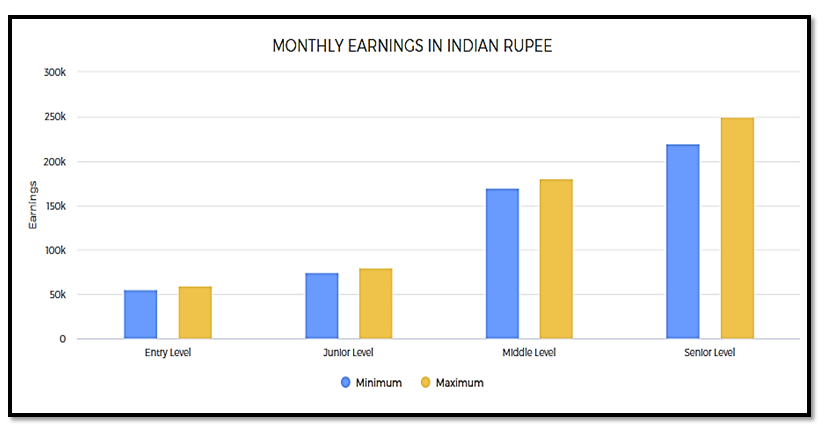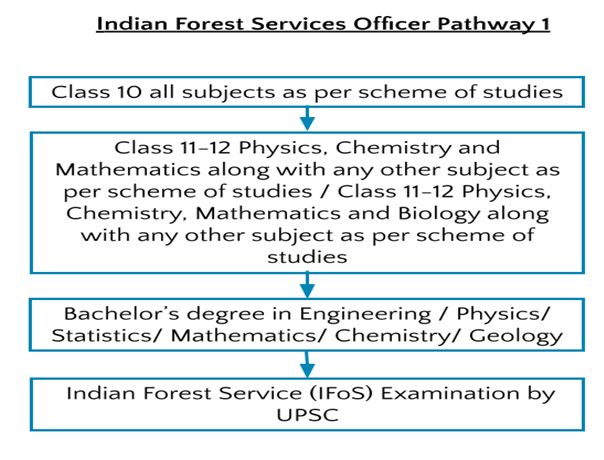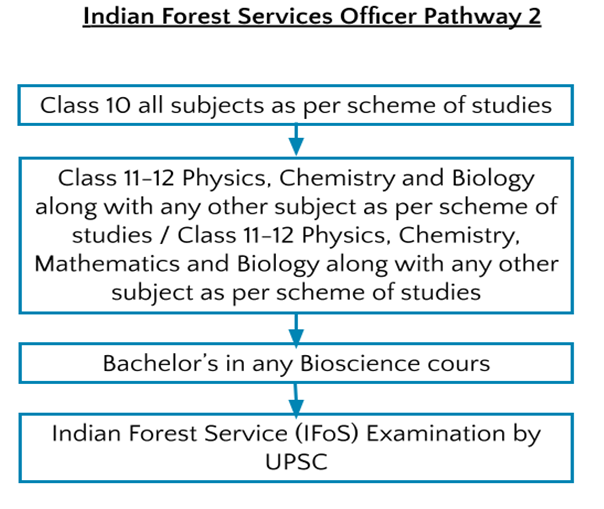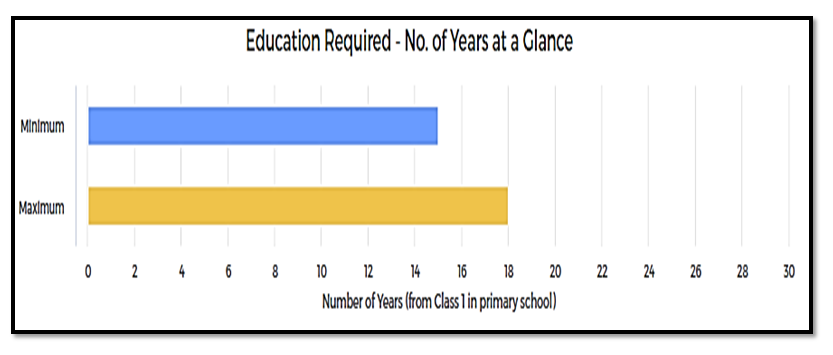Indian Forest Services Officer
Entry Level Qualification
Graduate
Career Fields
Government & Defense Services
For Specially Abled





Career Entrance Exam
About Career
PARTICULARS | DESCRIPTION |
Name | Indian Forest Services Officer |
Purpose | Management of Forest Resources |
Career Field | Government & Defense Services |
Required Entrance Exam | UPSC IFS |
Average Salary | 550000 - 800000 Rs. Per Year |
Companies For You | Assistant Conservator of Forests, Conservator of Forests & Many More |
Who is Eligible | Graduate |
1. Indian Forest Service (IFoS) is one of the three All India Services of the Union Government of India. As an Indian Forest Service (IFoS) officer you would be involved in implementation and execution of the plans and projects under the National Forest Policy. The National Forest Policy aims at retaining environmental stability by maintaining and restoring ecological balance, protecting natural heritage, increasing forest covers via afforestation and other programmes, increasing forest use productivity to fulfil national needs and many other purposes.
2. As an IFoS officer, you would be involved in various forest conservation and preservation activities such as protecting forest trees and analysing the overall depletion of forest cover, inspecting illegal felling of trees, initiating and organising tree-planting drives and afforestation programmes, ensuring safety and prevention of wildlife animals, ensuring that all the forest rules and regulations are being obeyed, drafting of legal laws and rules that preserve and protect the wildlife, and so on.
3. As an Indian Forest Service Officer, you will be entrusted with the responsibility of planning and implementing of Forest Policies and also managing the public and private forested land for economic and conservational objectives.You will also determine how to conserve wildlife habitats, examine the quality of water, stability, and fertility of the soil, and how environmental laws and rules are followed. You will also be formulating plans and strategies for planting and growing trees to increase forest cover to maintain ecological balance.
Key Roles and Responsibility
1. As an IFoS officer you would monitor contract compliance and results of forestry activities to assure adherence to government regulations.
2. As an IFoS officer you would plan and supervise forestry projects, such as determining the type, number and placement of trees to be planted, managing tree nurseries, thinning forest and monitoring growth of new seedlings.
3. As an IFoS officer you would establish short-and long-term plans for management of forest lands and forest resources.
4. As an IFoS officer you would determine methods of cutting and removing timber with minimum waste and environmental damage.
5. As an IFoS officer you would supervise activities of other forestry workers.
6. As an IFoS officer you would perform inspections of forests or forest nurseries.
7. As an IFoS officer you would plan and direct forest surveys and related studies and prepare reports and recommendations.
8. As an IFoS officer you would negotiate terms and conditions of agreements and contracts for forest harvesting, forest management and leasing of forest lands.
9. As an IFoS officer you would plan cutting programs and manage timber sales from harvested areas, assisting companies to achieve production goals.
10. As an IFoS officer you would contact local forest owners and gain permission to take inventory of the type, amount, and location of all standing timber on the property.
11. As an IFoS officer you would map forest area soils and vegetation to estimate the amount of standing timber and future value and growth.
12. As an IFoS officer you would monitor forest-cleared lands to ensure that they are reclaimed to their most suitable end use.
13. As an IFoS officer you would plan and implement projects for conservation of wildlife habitats and soil and water quality.
14. As an IFoS officer you would provide advice and recommendations, as a consultant on forestry issues, to private woodlot owners, firefighters, government agencies or to companies.
15. As an IFoS officer you would monitor wildlife populations and assess the impacts of forest operations on population and habitats.
Career Entry Pathway
Class 10 all subjects as per scheme of studies – Class 11-12 Physics, Chemistry and Mathematics along with any other subject as per scheme of studies / Class 11-12 Physics, Chemistry, Mathematics and Biology along with any other subject as per scheme of studies–Bachelor’s degree in Engineering / Physics/ Statistics/ Mathematics/ Chemistry/ Geology – Indian Forest Service (IFoS) Examination by UPSC
After completing Class 11-12 Physics, Chemistry and Mathematics along with any other subject as per scheme of studies / Class 11-12 Physics, Chemistry, Mathematics and Biology along with any other subject as per scheme of studies, you can pursue Engineering or any equivalent course in graduation. Alternatively, you can choose to study for a degree in Physics, Statistics, Mathematics, Chemistry, or Geology. After graduation, you must apply for UPSC IFoS examination and qualify in order to be eligible for the further selection process.
Class 10 all subjects as per scheme of studies – Class 11-12 Physics, Chemistry and Biology along with any other subject as per scheme of studies / Class 11-12 Physics, Chemistry, Mathematics and Biology along with any other subject as per scheme of studies – Bachelor’s in any Bioscience course - Indian Forest Service (IFoS) Examination by UPSC
After completing Class 11-12 Physics, Chemistry and Biology along with any other subject as per scheme of studies / Class 11-12 Physics, Chemistry, Mathematics and Biology along with any other subject as per scheme of studies, you can pursue graduation in any Bioscience course such as Biology, Zoology, Agriculture, Botany, Animal Husbandry, Veterinary Sciences, etc. After graduation, you must apply for UPSC IFoS examination and qualify in order to be eligible for the further selection process.
Required Qualification & Competencies
To become an Indian Forest Services Officer, you have to appear for and clear a UPSC (Union Public Service Commission) examination process. To appear for UPSC Indian Forest Service Examination, you must have a bachelor’s degree in science or Engineering. After completing your graduation, you can start preparing for Indian Forest Service Examination conducted by UPSC. A post-graduation isn’t necessary to appear in this examination as the preparation of this examination is entirely different.
MINIMUM EDUCATION REQUIRED | MAXIMUM EDUCATION REQUIRED |
Under Graduate Undergraduate Degree / Honours Diploma / Graduate Diploma (equivalent to a Degree) Programs for which the minimum eligibility is a pass in Higher Secondary / Class XII School Leaving examination. | Post Graduate Postgraduate Degree / Diploma / Certificate Programs for which the minimum eligibility is a pass in Graduation / equivalent Diploma program like Honours Diploma or Graduate Diploma. |
Competencies Required
Interests
1. Realistic- Realistic occupations frequently involve work activities that include practical, hands-on problems and solutions. They often deal with plants, animals, and real-world materials like wood, tools, and machinery. Many of the occupations require working outside, and do not involve a lot of paperwork or working closely with others.
2. Investigative- Investigative occupations frequently involve working with ideas, and require an extensive amount of thinking. These occupations can involve searching for facts and figuring out problems mentally.
3. Enterprising- Enterprising occupations frequently involve starting up and carrying out projects. These occupations can involve leading people and making many decisions. Sometimes they require risk taking and often deal with business.
4. Social- Social occupations frequently involve working with, communicating with, and teaching people. These occupations often involve helping or providing service to others.
Abilities
1. Oral Comprehension- The ability to listen to and understand information and ideas presented through spoken words and sentences.
2. Oral Expression- The ability to communicate information and ideas in speaking so others will understand.
3. Deductive Reasoning- The ability to apply general rules to specific problems to produce answers that make sense.
4. Inductive Reasoning- The ability to combine pieces of information to form general rules or conclusions (includes finding a relationship among seemingly unrelated events).
5. Information Ordering- The ability to arrange things or actions in a certain order or pattern according to a specific rule or set of rules (e.g., patterns of numbers, letters, words, pictures, mathematical operations).
Knowledge
1. Law and Government- Knowledge of laws, legal codes, court procedures, precedents, government regulations, executive orders, agency rules, and the democratic political process.
2. Geography- Knowledge of principles and methods for describing the features of land, sea, and air masses, including their physical characteristics, locations, interrelationships, and distribution of plant, animal, and human life.
3. Public Safety and Security- Knowledge of relevant equipment, policies, procedures, and strategies to promote effective local, state, or national security operations for the protection of people, data, property, and institutions.
Personality
1. You are always or mostly organised in your day-to-day life and activities.
2. You are always or mostly organised in your day-to-day life and activities.
3. You are always or mostly disciplined in your action and behaviour.
4. You are always or mostly a soft-hearted person.
5. You always prefer to experience new things and have new experiences or you mostly do.
6. You prefer to experience new things and have new experiences sometimes.
7. You are always practical or in most situations.
Career - Job Opportunities & Profiles
Once you have successfully cleared the Indian Forest Services Examination, you will be assigned for Foundation training at Lal Bahadur Shashtri National Academy of Administration at Mussoorie. After the Training at LBSNAA, you will be sent for Forest Service Specific Orientation at the Indira Gandhi National Forest Academy (Dehradun).Here, you will be trained in Forest and Wildlife Management, Soil conservation, Surveying, and Scheduled Tribes. After training, you will initially be appointed as an Assistant Conservator of Forests / Range Forest Officer.
Career Growth
At entry level you will be appointed as Assistant Conservator of Forests. The following are the posts according to the ranks:
1. Assistant Conservator of Forests
2. Deputy Conservator of Forests
3. Conservator of Forests
4. Chief Conservator of Forests
5. Additional Principal Chief Conservator of Forest
6. Principal Chief Conservator of Forests
7. Principal Chief Conservator of Forests (Head of Forest Forces)
Salary Offered
1. As a Probationary Officer / Assistant Conservator of Forests / Asst. Dy. Conservator of Forests, you will earn around Rs. 55,000 – Rs.60,000 per month.
2. As a senior Deputy Conservator of Forests, you will earn around Rs. 65,000 – Rs. 70,000 per month.
3. As a Junior Deputy Conservator of Forests, you will earn around Rs. 75,000 – Rs. 80,000 per month.
4. As a Deputy Conservator of Forests (Selection Grade), you will earn around Rs. 1,15, 000 – Rs. 1,20, 000 per month.
5. As a Conservator of Forests / Chief Wildlife Warden, you will earn around Rs. 1,45,000 – Rs. 1,50,000 per month.
6. As a Chief Conservator of Forests, you will earn around Rs. 1,70,000 – Rs. 1,80,000 per month.
7. As a Principal Chief Conservator of Forests, you will earn around Rs. 2,00,000 – Rs. 2,25,000 per month.
8. As a Principal Chief Conservator of Forests (Head of Forest Force), you will earn around Rs. 2,50,000 per month.

Monthly Earning In Indian Rupee
Entry Level | Junior Level | Mid Level | Senior Level | |||||
Min Earning | Max Earning | Min Earning | Max Earning | Min Earning | Max Earning | Min Earning | Max Earning | |
55000 | 60000 | 75000 | 80000 | 170000 | 180000 | 220000 | 250000 | |
1. Entry level: 0 - 2 years of work experience
2. Junior Level: From 1 to 12 years of work experience
3. Mid Level: From 5 to 20+ years of work experience
4. Senior Level: From 10 to 25+ years of work experience
Work Activities
1. Getting Information- Observing, receiving, and otherwise obtaining information from all relevant sources.
2. Identifying Objects, Actions, and Events- Identifying information by categorizing, estimating, recognizing differences or similarities, and detecting changes in circumstances or events.
3. Organizing, Planning, and Prioritizing Work- Developing specific goals and plans to prioritize, organize, and accomplish your work
4. Communicating with Supervisors, Peers, or Subordinates- Providing information to supervisors, co-workers, and subordinates by telephone, in written form, e-mail, or in person.
5. Establishing and Maintaining Interpersonal Relationships- Developing constructive and cooperative working relationships with others, and maintaining them over time.
6. Making Decisions and Solving Problems- Analysing information and evaluating results to choose the best solution and solve problems.
7. Judging the Qualities of Things, Services, or People- Assessing the value, importance, or quality of things or people.
8. Communicating with Persons outside Organization- Communicating with people outside the organization, representing the organization to customers, the public, government, and other external sources. This information can be exchanged in person, in writing, or by telephone or e-mail.
9. Analysing Data or Information- Identifying the underlying principles, reasons, or facts of information by breaking down information or data into separate parts.
10. Performing General Physical Activities- Performing physical activities that require considerable use of your arms and legs and moving your whole body, such as climbing, lifting, balancing, walking, stooping, and handling of materials.
11. Monitoring and Controlling Resources- Monitoring and controlling resources and overseeing the spending of money.
12. Assessing compliance with environmental laws.
13. Managing agricultural or forestry operations.
14. Developing plans to manage natural or renewable resources.
15. Determining methods to minimize environmental impact of activities.
16. Inspecting condition of natural environments.
Future Prospects
According to the 68th annual report provided by the UPSC, it is estimated that around 3057222 is the total number of applications received for Civil Services Examinations in the year 2017-18. The recruitment process usually depends on the ruling government policies and most importantly by the policies and requirements for administrative officers. The career growth in this field is slow but with necessary Forest Policy changes aretaking place, there is still a demand for more effective measures to increase forest areas.
Future Prospects At A Glance
Current (0-1 year) | Long Term (2-5 year) | Very Long Term (6-10 years) |
No Change | Moderate Growth | Moderate Growth |






